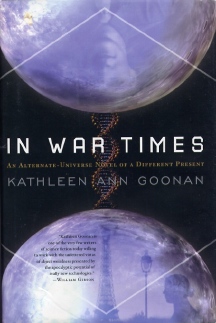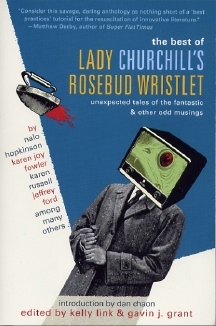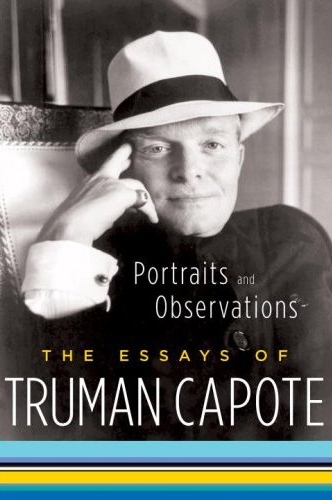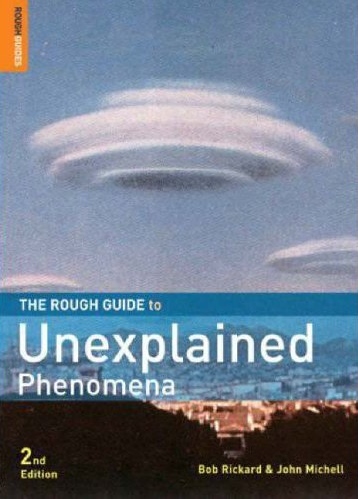|
|
|
|
This Just In...News
From The Agony Column
|
|
10-19-07: Mario Guslandi Reviews 'The Best of
Lady Churchill's Rosebud Wristlet': Agony Column Podcast News Report :
A 2007 Conversation With Ann Packer
|
"..a feast..."
Today, we're leading
with Mario
Guslandi's review of 'The Best of Lady Churchill's Rosebud Wristlet'
edited by Gavin J. Grant and Kelly Link.
I'll add only that, like Mario, I think that there are pieces in
here that will utterly delight a wide variety
of readers. That's down to Grant and Link's editorial focus which
is pretty simple but alas, not so common as one might hope. That
would be
that they simply print stories they like. To
get a sense of their taste, you can listen to this interview;
[which includes Karen Joy Fowler] or just buy the book. Be prepared
to loan it out, because to my mind, it's the sort of book that has
you
pressing it on your friends, saying, "Read this story, it's
so you." But
don’t plan on getting it back.
|
Agony Column Podcast News Report : A 2007 Conversation
With Ann Packer : Everyday Horrors
|
|
Ann
Packer at the Capitola Book Café on October 18, 2007. |
Today's podcast is a
conversation with author Ann Packer, author of 'The Dive from Clausen's
Pier' and 'Songs Without Words'. I found Packer's work
to be an extraordinarily observant vision of suburbia. She knows how to
accumulate detail to put readers deeply inside the lives of her everyday
characters. Then she douses those characters' lives with a dose of realistic
horror. To my mind – and I asked her about this – she's reminiscent
of Stephen King in her willingness turn everything upside-down for nice,
if not perfect people. 'Songs Without Words', her latest novel, follows
the friendship of two women as their lives go to hell in a handbasket.
Like Steve Almond, she's not shy about forcing us to face our fears as
parents. Being a parent is, alas, something of a cavalcade of terror. There
is actually, factually no end to the worries of a parent. Solve one potential
problem, and three more horrific possibilities present themselves, each
more life-devastating than the last. I also talked to her about her writing
process, which as you might imagine, is rather organic. You
can hear the entire twenty-something minute interview, conducted in the
cramped back
of the Capitola Book Café, in this MP3. Maybe make yourself a calming
cup of tea.
|
| |
|
10-18-07: 'Portraits and Observations: The Essays of Truman Capote' ; Agony Column Podcast News Report : NPR Report on Austin Grossman
|
42 Kinds of Class
I no longer need a nightstand. My nightstand is a stack of books that reaches
the ceiling.
This is to say, rather that there can be no excess of books for the bedside,
books fit for interstitial reading. The problem isn't finding them; there
are plenty that qualify. The problem is keeping the stack small enough
so that you don't have to stand on the bed to find the book at the top
of the stack. Or risk an avalanche should you try to snatch one fromteh
center. Winnowing down; always an issue.
Sometimes though, the publishers make it easy for you. That's the case
with 'Portraits and Observations: The Essays of Truman Capote' (Random
House ; October 16, 2007 ; $28.95). Here are 42 essays, riffs and what
might in this day and age be called and prove to be rants; herein they
are something just as powerful but far more elegant. But for all the craft,
for all the verve and the gorgeous, languorous language, what's really
striking about these pieces if how they slot together to paint a vivid
picture of world that is:
Gone.
Capote is the quintessential 20th century essayist and writer. He defined
literature in his day, but his day has alas passed. Not that his writing
is any less involving and engaging. It seems more urgent now, even as it
beckons us to a world that no longer exists. Pick up 'Portraits and Observations:
The Essays of Truman Capote' and on any page you'll be whisked through
the doors of perception into lives as remote as the Stone Age.
It's the language that takes you there, language that retains it power,
language that finds its power enhanced by the passage of time and by its
ability to offer us passage to climes so remote that we cannot tough them
ever again. New Orleans, 1946. "I am more or less disgusted by the
phrase 'old charm.'... The main portion of this city is made of of spiritual
bottomland, streets and sections rather outside the tourist belt." Fontana
Vecchia, 1951. "'There used to be many werewolves in Taorima,' he
said, his gray eyes regarding me steadily; then with a disdainful shrug,
'Now there are only two or three.'" Self-Portrait, 1972. "Not
long ago, my doctor suggested that I adopt some healthier hobby other than
wine-tasting and fornication. He asked if I could think of anything. I
said, 'Yes, murder.'"
Gone.
But the language remains, in a collection that includes a non-fiction novel – "Hand-Carved
Coffins", portraits of Mae West, Elizabeth Taylor, Pablo Picasso,
Marilyn Monroe, and Willa Cather, Capote's last written words, written
the day before he died.
It's easy to think of the 20th century as a chaotic, horrific mess, as
the time when the world descended into hell and emerged into a science
fictional dystopia. 'Portraits and Observations: The Essays of Truman Capote'
reminds us that there was space in those years, space for beauty and elegance
and truth and joy. In so doing, we are reminded that we might snatch these
moments yet again, in our very different world, if only for the time it
takes us to read Capote's words. We are there and we are here. Two places
at once.
|
Agony Column Podcast
News Report : NPR Report on Austin Grossman : "Unconventional Education
Fuels Author's First Novel"

On Sunday, NPR
broadcast this report on Austin Grossman's unusual educational experiences
that led
to his first novel, 'Soon I Will Be Invincible'. Today,
I've got a high-quality MP3 copy for you to download. It's pledge drive
for many NPR stations, and I'm told that some stations – alas, such
as my station – did not get this report as part of the "pledge
drive" edit for Weekend Edition Sunday. I'd like to thank those readers
who helped keep this story in the 25
Most Emailed Stories for two full
days. That's a great help to this column. Readers who want to contribute
even more to this affair can pledge via the web at kusp.org and mention
my name. But don’t worry about it. I'm just lucky to be doing what
I'm doing, and I realize that these columns and podcasts probably result
in you buying books, which is the primary purpose of the Agony Column.
So long as enough of us buy books, they're likely to keep making them.
Otherwise Sony is going to make you an offer you can currently refuse but
in the future – well, predictions of the future are notoriously about
the present. And so I predict: more books.
|
| |
|
10-17-07: A Review of 'In War Times' by Kathleen Ann Goonan
; Agony Column Podcast News Report: A Conversation With Scott Hamman and
Tammie Stallings of Handee Books
|
For All Time
 |
|
| A
novel for all times. |
For some time,
I've had a sort of bee in my bonnet about science fiction set in
the past. I'm not talking about alternate history. I'm interested
in books that are set in the past and look forward to the future we currently
occupy as if that future were a sort of "science fiction" future,
and anticipate it in a manner that engages not just the history lover,
but also those of us who love speculative science fiction.
'In War Times' by Kathleen Ann Goonan is that book, and much more besides.
It's a sweeping yet concise family saga, with a powerful vision of war and
everything it does. Goonan writes a page-turning novel with engaging characters
and concepts packed onto every page. Here's
a link to my review of the novel. This is a book that should have a huge appeal to a wide variety of readers,
whether your preferences are for literary or genre fiction. 'In War Times'
is both, a novel keeps you in its world long after you have finished reading.
|
Agony Column Podcast News Report: A Conversation With Scott Hamman and Tammie Stallings of Handee Books : Internet Only, Actually Real
|
|
Too
handy for those of us on a budget!
|
Today I talk with Scott
Hamman and Tammie Stallings of Handee
Books. Take a look at their
web page and drool with envy at their selection. I have had the privilege
of actually going to their store, which is now totally virtual. I have
to say that almost never have I seen so many books that I wanted to buy.
It was positively frightening. I managed to get out of there with my finances
intact, but only just barely. You'll definitely want to hear what these
booksellers and bibliophiles have to say; and all you have to do is listen
to the MP3. I refuse to take any responsibility for what happens afterwards.
|
| |
|
10-16-07: Bob Rickard and John Mitchell 'The Rough Guide
to the Unexplained' ; Agony Column Podcast News Report : Live at the Capitola
Book Café With Andrew Kimbrell
|
Second Edition Strange
|
|
Saucer
clouds – simulacra, not UFOs. |
There are lots of ways
to do an imprint, and one of the more interesting, if restricted ways is
the path explored by imprints like the so-called "Dummies" books,
or the Rough Guides. I must say I find it kind of odd and a bit off-putting
to see these sorts imprints expand further and further afield from their
original mission. After all, I ask myself, I know I might need a Rough
Guide to Mexico. It's a place, so sure, you want a guide book. But I
was not so sure I needed 'The Rough Guide to the Unexplained' (Rough
Guides / Penguin Books ; September 3, 2007 ; $21.99). The Unexplained
is not a place. It's a ... well, it's a concept. And I suppose that makes
it explorable in the "Rough Guide" sense.
But when you see the names of Bob Rickard and John Mitchell attached to
such a work, it quickly takes on a very different nature. Bob Rickard founded
The Fortean Times back when many of us were hoping to get our driver's
licenses, and with Mitchell he co-authored earlier versions of this Rough
Guide. So, sure, it's a Rough Guide, and funnily enough, the Rough Guides
have strayed from the straight path to wind up here, in the world of the
very Fortean world of the Unexplained.
So what is 'The Rough Guide to the Unexplained'? It's 454 packed pages
of Forteana with a boatload of black and white photographs. In the informative
introduction, the authors set out a very nice précis of Fortean
thought, emphasizing the humor, the wonder and the transience of scientific
thought. It's a nice, well-thought out and fun to read introduction to
the Fortean world and Charles Fort himself. Even if you own Fort's works,
and especially if you don’t, this is a great way to plug yourself
directly into that sense of perception.
From there, well, not surprisingly, things get weird. The book is divided
into thirteen major sections, and each section broken down further into
articles and entries. The major sections include: Teleportation, Strange
Rains, Wild Talents, The Madness of Crowds, The Fairy Folk, Mysterious
Entities, The Haunted Planet, Signs and Portents, Simulacra and Other Images,
Monsters, Living Wonders, Tail Pieces and Notes and Further Reading. The
book is thoroughly indexed, meeting at least the Monkey Man standard of
measurement. That is to say, I was able to look up The Monkey Man in the
index and find an entry in the book. As readers should know, The Monkey
Man is one of my favorite Fortean critters, part monster, part mass hysteria,
part – well, who the heck knows? Robot or rodent, it hardly matters.
What does matter with regards to this book is that it gets not only an
entry, but an illustration taken from an Indian newspaper reporting . One
of the exemplary aspects of this book is the rich level of illustration
and example. This includes not just reprinted illustrations, but a generous
number of illustrations that reprint news articles. The inclusion of these
articles really adds a layer of interest and veracity to the proceedings.
Not, mind you, that Rickard and Mitchell are implying that the events reported
are real, but rather that the reports themselves are real. This a critical
point; Forteana and Fortean studies are as much about the reports of phenomena
as they are about the phenomena themselves. Forteana is a sort of newswatch
on our myths and legends, a tracker of our campfire tales.
'The Rough Guide to the Unexplained' has a variety of uses. This is probably
not the sort of book you’re going to read cover-to-cover. But at
any given juncture, you can pick this one up and read a cogent, imagination-inspiring
article about a subject you might never have considered. So stack it up
for general-purpose nightstand reading and essential reference material
for any writer. To my mind, one can never have too many books like this
and this particular volume is just superb. It's a dense thicket of oddness,
a lively read that will effectively blow your mind whenever you pick it
up. The Unexplained may not be a place, and it may not actually need a
rough guide; but serious readers might very well need this book.
|
Agony Column Podcast
News Report : Live at the Capitola Book Café With Andrew Kimbrell : "A
fundamentally ethical crisis"
Today's Agony Column
Podcast News Report is a report from the Capitola
Book Café last
Thursday, when I went to attend the reading by Andrew Kimbrell and stopped
to talk with Kimbrell and a couple of very well-informed
other attendees. First, I talk to Ken Kimes, who with his wife
Sandra,
founded New Natives Organic Sprouts more than 25 years ago here in Santa
Cruz County. Then I spoke with Tim
Galarneu of the Community Alliance with Family Farmers, an organization dedicated to the concept of organic, local
agriculture. And finally, I spoke with Andrew Kimbrell himself, just before
he went to the podium, to find out how he was going to modify and expand
the themes of our conversation earlier that day. You
can find them all on the MP3 here. You'll probably eat better as a result and just as importantly,
save yourself some money.
|
| |
|
10-15-07: A 2007 Interview with Andrew Kimbrell ; NPR Report on Austin Grossman
|
"Drought
resistant plants, plants that taste better, plants that reduce fat...Complete.
Science. Fiction."
|
|
From
the CAFF Website; you'll hear more about them in tomorrow's
podcast news.
|
Too bad most of what Andrew Kimbrell talks about isn't science
fiction, even though some twenty years ago, it might have sounded like
SF. Mutant
super weeds. ("Return of the Giant Hogweed", anyone?) Tomatoes
spliced with fish genes so they can be frozen yet remain fresh. Recombinant
peas turned deadly by gene splicing. Pollution in the DNA ecosystem.
Welcome to 'Your Right to Know', a right that actually does not exist
and one which few have been willing to quibble over. But for readers
who like their food to be non-toxic, for readers who like their dystopian
science fiction to peek out at them from the grocery store shelves and
for readers who are simply nail-spitting mad at everything damn thing
in general because it's all such a clusterfuck, then Kimbrell is your
man. He's on point on message and knows his stuff. More importantly,
he knows stuff you probably don’t know or at least, he's got it
cleverly arranged to give you an unpleasantly clear view of reality in
a manner that is entertaining and highly energizing. I'll confess. I
frankly was not all that worried about this stuff before I picked up
his book. My attitude was, hell, I'm a mutant already. What’s the
big deal?
 |
|
| Safe
as rBGH milk. |
Well, gene-splicing
to sell pesticides is a problem so far as I'm concerned. You want to
genetically engineer mutant-rabbit bears that can jump hundred
of feet and pounce on a Prius? Have at it! But gene-splicing corn that
you can dip in RoundupV7.8 because V7.7 no longer kills the Giant Hogweed,
well, that's A) a boring use of a potentially exciting technology and
B) takes the corn tortillas and the entire menu of most of my favorite
Mexican restaurants right off the plate, thus leading to personal starvation.
But really, I don’t eat very much any more, so that's all good.
You won't want to eat out very much either after reading 'Your Right
to Know', but when you go shopping at least Kimbrell provides you with
a game plan for the grocery store. Not a big honkin' list, but a nice
overview of how to make sure that if you are what you eat, you won't
be a fishy tomato. Kimbrell is a practiced and compelling voice, the
sort of guy you might think to sit down and listen to for a few passing
minutes only to stay glued to your chair until the end. As ever, I have
defeated my own stats by posting a RealAudio and an MP3
version of the
interview. When you manage to pry yourself out of your chair, take a
trip to your grocery store and see, just see if those shelves look the
same.
|
"Unconventional Education Fuels Author's First Novel"
|
 |
Austin
Grossman at KQED.
|
I
have a report up on NPR for Weekend Edition Sunday on Austin Grossman's
education and how it contributed to his first novel, the excellent
'Soon I Will Be Invincible'.
Readers can help contribute to this website and
column by going to this web page and emailing the story. You can listen
to the RealAudio and as soon as I can get my hands on the original WAV
file, I'll post it here as one of the Agony Column Podcast News Reports.
Stay tuned, and press that email button.
There's another way to contribute
to this column, which is to pledge some trivial amount to KUSP; mention
my name and let them you know you appreciate their support of my interviews.
Or heck, just enjoy, enjoy, enjoy. Kick back and read a book.
|
| |
|
|








